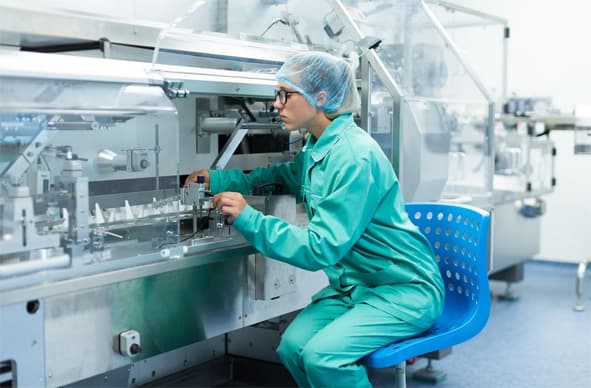
How Protein Production Services Shape The Future? Protein production services are significantly impacting the biotechnology industry’s future. These services enable groundbreaking discoveries for unique medicines, greener fuels, and innovative materials in the future.
Scientists are using protein synthesis to create new drugs and therapies that have the potential to make a positive impact on a global scale. It have the potential to enhance human well-being and surpass other industries.
Proteins in farming help boost crop productivity and protect against pests, changing how we grow and store our food. Proteins are now used in industrial manufacturing to help with critical chemical reactions. It is excellent because it allows for more environmentally friendly and sustainable production methods.
In biotechnology, innovators are making great strides in protein production. This progress leads to a future where we can find solutions to pressing challenges.
What is Protein production?
Protein production is the process of making a particular protein using biotechnology. Gene expression can be manipulated in an organism to make it produce a lot of a specific gene. The process involves converting recombinant DNA into mRNA, which then turns into polypeptide chains. These chains are folded into functional proteins and can be directed to specific parts of the cell or outside of it. Next, we need to purify the protein that has been expressed.
How Protein Production Services Shape the Future?
1. Development Of New Drugs And Therapies
Proteins could become essential to medical advancements, transforming research and treatment and bringing safer and more effective medications. Developing drugs has always been complicated, leading to drugs that have harmful side effects or don’t work well.
Scientists have discovered a way to produce large quantities of proteins, the incredible molecules that drive various biological processes. With their new knowledge, they can create drugs that target specific proteins related to diseases and health issues.
1. Precision medicine is now a reality, offering personalized treatments for patients in this new world. Proteins can help find new ways to treat diseases and disorders.
2. Scientists use proteins to develop influential and groundbreaking treatments for various conditions like cancer, autoimmune disorders, and rare genetic abnormalities. The protein production service offers hope for challenging illnesses by creating drugs from living things. It brings relief to those who need it most.
3. Protein synthesis advancements have made biologics more affordable and accessible.
Biotechnology is revolutionizing drug development, leading to safer, more effective, and specialized treatments in the future. Proteins have the potential to lead us to incredible breakthroughs in medical research, making our future healthier and better.
2. Creating Efficient Biofuels
Protein manufacturing services are helping create a greener society with biofuels. By using more renewable resources, we can rely less on fossil fuels. It could lead to a cleaner planet. Biofuels are a promising alternative to fossil fuels, aiming to reduce their harmful environmental impact. They are becoming increasingly important in this shift. Biofuels face challenges in terms of efficiency and competitiveness compared to traditional gasoline and diesel fuels. Good news! The ability to produce proteins on a large scale is a game-changer.
1. Proteins help enzymes convert biomass into biofuels. Mass-producing essential enzymes help researchers find ways to make biofuel production faster and more efficient.
2. Biofuels have become more environmentally friendly due to increased energy output and reduced greenhouse gas emissions. Protein engineering has many benefits to offer. These molecules are versatile and allow researchers to explore new biofuel sources.
3. To expand the variety of materials used for biofuels, scientists modify proteins. It reduces the need for traditional crops and prevents competition with food production.
These developments could make a big difference. Imagine a greener transportation sector that uses eco-friendly biofuels to reduce carbon emissions and air pollution. The future of sustainable energy is all about using untapped renewable resources to power our planet.
3. Engineering New Materials
Imagine a future where engineers use science and creativity to create new materials. Protein engineering helps scientists create tough, lightweight materials that can withstand tough challenges. Proteins are the key to finding a solution. They are like a molecular playground where scientists can change their properties for different needs. Using their newfound power, they develop durable materials that surpass previous limits.
1. Protein-engineered materials can be used in the aerospace industry to make airplane parts that are lightweight and very strong. This engineering achievement improves flying abilities and reduces fuel usage. These materials could revolutionize air travel, bringing about a new era of productivity and sustainability.
2. Protein-engineered materials are used in transportation to make automobiles stronger, safer, and more fuel-efficient. The strong and lightweight composites make our roadways more sustainable and effective, leading to a greener future.
3. The construction industry is becoming more environmentally friendly and sustainable due to strong and sustainable materials. Protein-engineered materials make structures resilient and sustainable. It allows buildings to withstand the forces of nature and time gracefully.
But these materials are not only used in construction. They are used throughout the entire industry, reaching every corner and aspect. New materials are emerging and transforming industries that we never thought could be changed. These materials help industries like aircraft, transportation, electronics, and energy grow in previously impossible ways.
Bottom Line
Protein synthesis services in biotechnology have revolutionized sustainable energy and medical advancements. Protein production services have a significant impact on biotechnology. Various industries experience growth by utilizing these services, significantly impacting multiple sectors, including material engineering, health, and energy.
The future of biotechnology looks bright and exciting thanks to ongoing progress and innovation. Protein manufacturing services will be crucial in groundbreaking discoveries and technological revolutions as biotechnology progresses. These services are crucial for the future of biotechnology. They open new scientific research opportunities to improve people’s well-being and promote sustainability.



